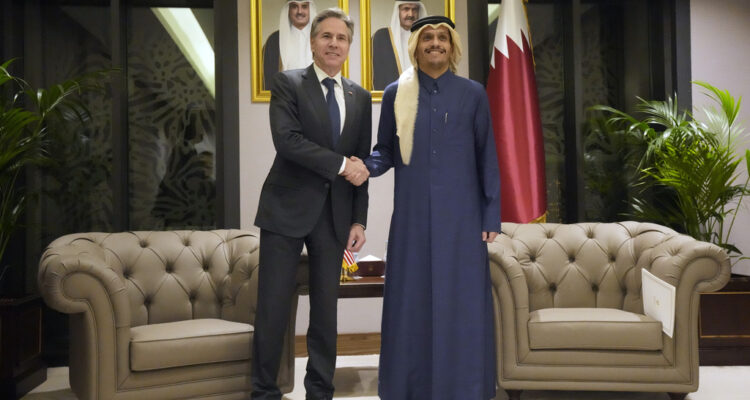US Official: ‘If you continue to negotiate for months and months and try to get a perfect deal … you risk having no hostages left to save.’
By JNS
Although U.S.-, Egyptian- and Qatari-moderated negotiations between Israel and the Hamas terror organization are ongoing in Doha, there is a consensus among the leaders of the three moderating countries that the diplomacy is “in the endgame,” a senior U.S. official told reporters on Friday from Doha.
The past 48 hours have been “very constructive” and took place in a “constructive atmosphere,” the senior official said, echoing a joint statement that the three countries released earlier in the day. Meetings will reconvene “at this level” by the end of next week in Cairo, the official said.
Those assembled in Doha discussed the “quite serious” consequences that would result from an attack that Iran has promised, the senior official said.
The official called the negotiations “the most constructive in 48 hours we’ve had in many months.” The Israeli team has been “clearly empowered” in the discussions, the official added.
Negotiations center on creating a “bridge” over the gaps that remained after Israel offered terms of a deal on May 27, U.S. President Joe Biden addressed that deal in a May 31 speech, Hamas responded with changes (“many of which were not acceptable”) on July 3 and Israel responded on July 27, according to the senior U.S. official.
“Our focus is getting the hostages out of Gaza and getting them out alive,” the official said.
“There’s still more work to do,” the official added, noting that a “large focus” of the necessary work relates to the logistics of which hostages would be released and which jailed Palestinians—many of them convicted criminals—would be exchanged for the hostages.
“This is a very difficult, complex deal,” the senior U.S. official said. “It is wrenching because this is about getting hostages out of Gaza. There are elements of the deal that are uncomfortable. Just like any deal like this, it is far from perfect.”
“If you continue to negotiate for months and months and try to get a perfect deal, or every last drop of blood from the stone, you risk having no hostages left to save,” the official said.
Asked what made the negotiations so uncomfortable, the senior U.S. official replied that “we just did a big prisoner exchange with Russia, and so when you’re trading—and there’s an exchange here.”
“Think about it from the Israeli perspective, you’re exchanging large numbers of Palestinian prisoners, many of whom have been convicted of very serious crimes against Israelis, for totally innocent people, who were taken hostage on Oct. 7,” the senior U.S. official said. “There’s an exchange element to the deal that is difficult.”
“Like any deal like this. We’ve done them, and you have to do them to save the lives of your citizens,” the official said. “There’s great joy in bringing people home because that’s what we have to do and that’s a commitment and obligation to our citizens, but these are not easy.”
The senior U.S. official also warned Iran about carrying out the attack that it has promised to unleash on Israel.
“Threats of a major missile attack against Israel—Iran has tried to suggest there’s some legitimacy to such course of action. There’s absolutely none,” the official said. “There’s nothing that has happened that would justify such an act.”
“We are prepared to counter it and defend Israel, should that come. We also encourage the Iranians—I know many are—not to go down that road because the consequences could be quite cataclysmic, particularly for Iran.”
Israeli Prime Minister Benjamin Netanyahu’s office stated that the Jewish state “appreciates the efforts of the United States and the mediators to dissuade Hamas from its refusal to agree to a deal for the release of the hostages.”
“Israel’s core principles are well known to the mediators and to the United States, and Israel hopes that their pressure will lead Hamas to accept the May 27 principles, in order for the details of the agreement to be implemented,” his office stated.
Earlier in the day Biden said that he was late for a White House event designating the Springfield 1908 Race Riot National Monument, in part, because he “was dealing with the ceasefire effort in the Middle East.”
“We are closer than we’ve ever been. I don’t want to jinx anything, but as my grandfather would say, ‘With the grace of God, the goodwill of the neighbors and a lot of luck, we may have something,’” Biden said. “But we’re not there yet. It’s much, much closer than it was three days ago. So, keep your fingers crossed.”
Earlier in the day, Biden spoke separately with Qatari Emir Sheikh Tamim bin Hamad Al Thani and with Egyptian President Abdel Fattah el-Sisi, according to the senior U.S. official. Biden reviewed “the significant progress made in Doha over two days of talks on a Gaza ceasefire and hostage release deal,” per the pool report.
